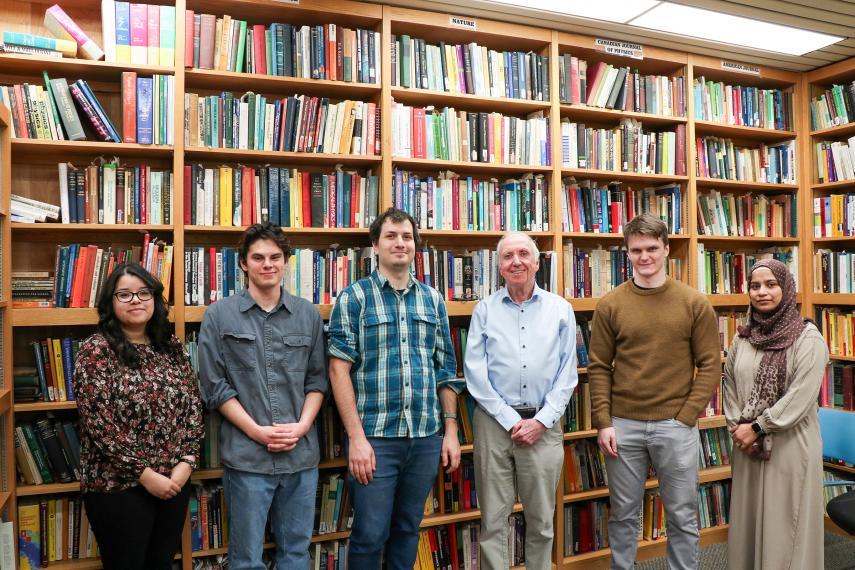Pioneering a Green Future: $1.5 Million Grant Fuels Groundbreaking Research

Mathematics professors lead the revolution in carbon capture solvent discovery.
Over the next five years, Dr. William Smith, University Professor Emeritus, and Dr. Mihai Nica, Assistant Professor, from the University of Guelph’s Department of Mathematics and Statistics are embarking on a revolutionary path amidst the pressing global climate crisis. Their goal: a monumental shift in carbon capture technology to combat climate change by means of an innovative combination of Artificial intelligence (AI) and molecular based theory.
Elevated by a substantial $1.5 million grant from the Natural Sciences and Engineering Research Council (NSERC) Alliance program, this transformative initiative stands to revolutionize existing carbon capture methodologies. The NSERC grant will be augmented by contributions from partners Delta Cleantech of Regina SK and Natural Resources Canada (NRCan).
Carbon capture solvents help fight climate change by trapping carbon dioxide (CO2) emissions from large emitters such as electricity power plants and exhaust gases from steel, cement, fertilizer and chemical production. The captured CO2 may either be used to manufacture useful end products or stored safely in underground repositories.
“The carbon capture solvents in current use are based on first-mile improvements of decades-old technology,” says Smith, the project’s principal investigator.
“To have any chance of achieving the goal of 'Net-Zero 2050', there’s a pressing need to develop more effective, environmentally friendly and cost-efficient solvents. However, there are many thousands of potential solvents out there, and it is prohibitively time-consuming and expensive to discover improved candidates by trial-and-error experimental studies alone.”
Smith and Nica will work with a team of graduate students and postdoctoral fellows to extend and implement on a large scale the basic version of the methodology recently developed by Smith’s group for predicting solvent properties from their molecular structure.
Integrating quantum mechanics, atomistic simulation and electrolyte thermodynamics with AI methods, the research team ventures to discover improved chemical solvents that can be used in carbon capture. Nica and Smith’s team will use a suite of computer algorithms to determine how well a potential solvent or a solvent mixture might capture CO2 in a more cost efficient and environmentally friendly manner. Industry partners will experimentally test and validate the most promising candidates discovered by the team, with the end goal of new and improved solvents becoming available.
"The substantial NSERC funding for the project positions us to pioneer eco-friendly, cost-efficient solvents crucial for a sustainable future," says Smith.
“Most of the funding will support high-caliber graduate students and postdoctoral fellows to move the research forward.”
Envisioning a seismic shift in carbon capture technology, the project aims to mitigate environmental impact while optimizing cost efficiency. "Our goal is to equip industries with transformative solutions for a more sustainable future," says Smith, underscoring the project's potential societal implications.
Collaborative Partnerships: Powerhouses of Innovation
Strategic alliances with Delta CleanTech and Natural Resources Canada (NRCan) signify a transformative collaboration that extends far beyond academic boundaries.
Delta CleanTech is a global leader in innovative CO2 capture systems. Their industry insights will prove invaluable in bridging the gap between theoretical research and practical application. Collaborating with Delta CleanTech harmonizes academic rigor with real-world implementation, recognizing the pivotal role of industry partnerships in driving impactful change.
NRCan, the Canadian federal government’s natural resources organization, fortifies the team’s ability to implement the research and to disseminate its results to industry. Their extensive knowledge base and commitment to sustainability align seamlessly with the project's objectives.
Together, these collaborations amplify the project's reach and impact, fostering a convergence of academic excellence and industry acumen to revolutionize the landscape of carbon capture technology.
Smith and Nica are actively inviting aspiring graduate students and postdoctoral fellows to apply to join them in contributing to reshaping the carbon capture landscape. Contact: bilsmith@uoguelph.ca.